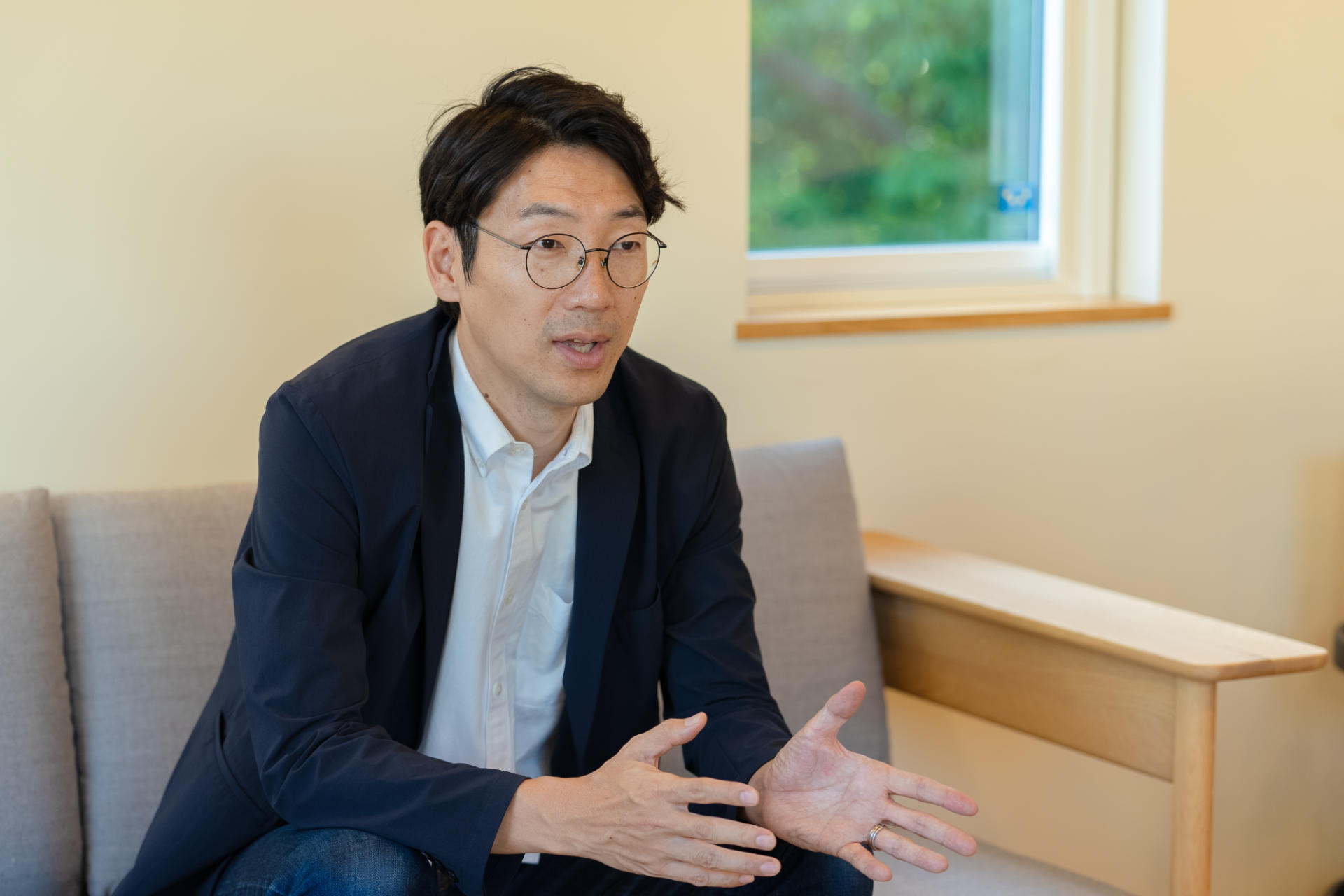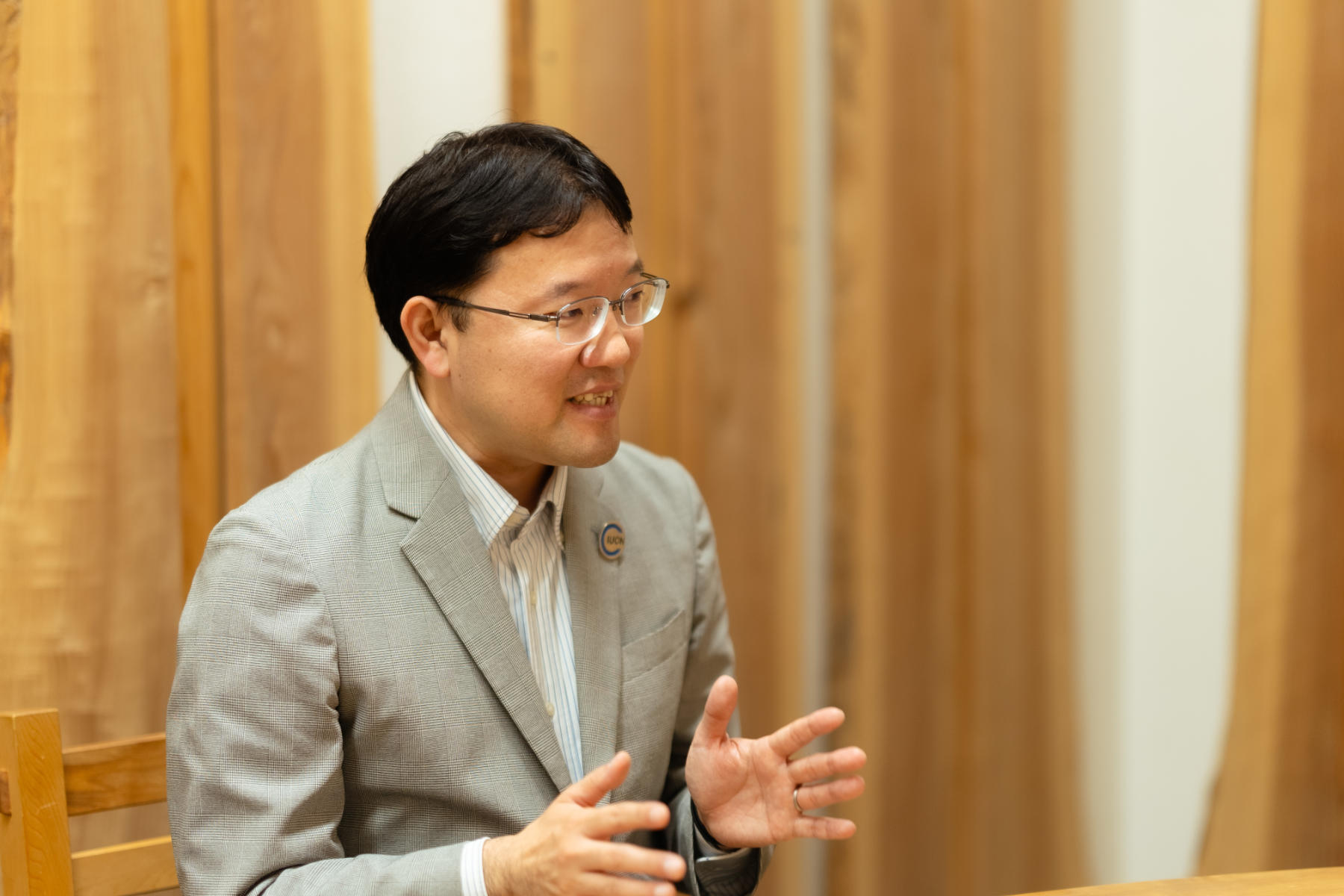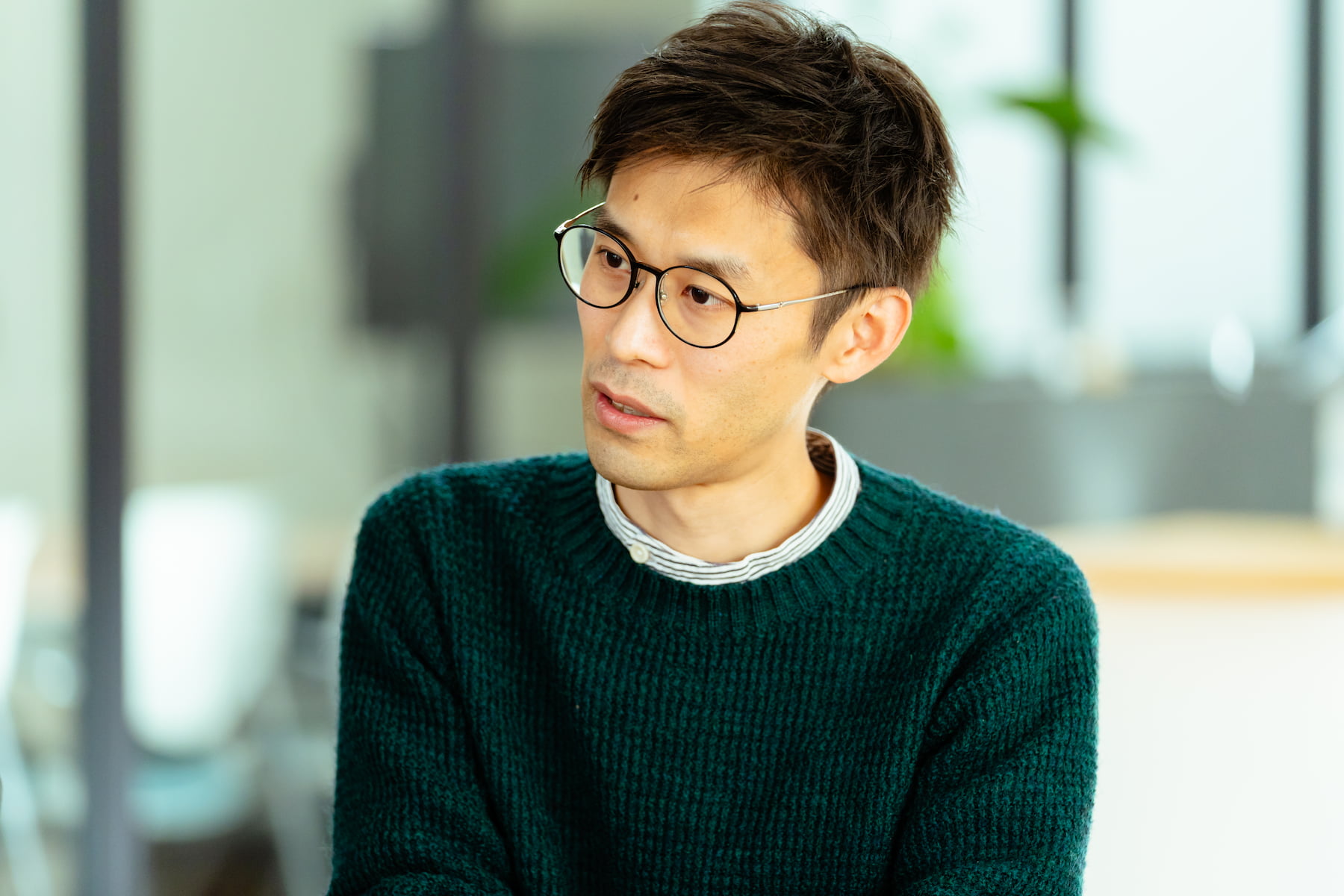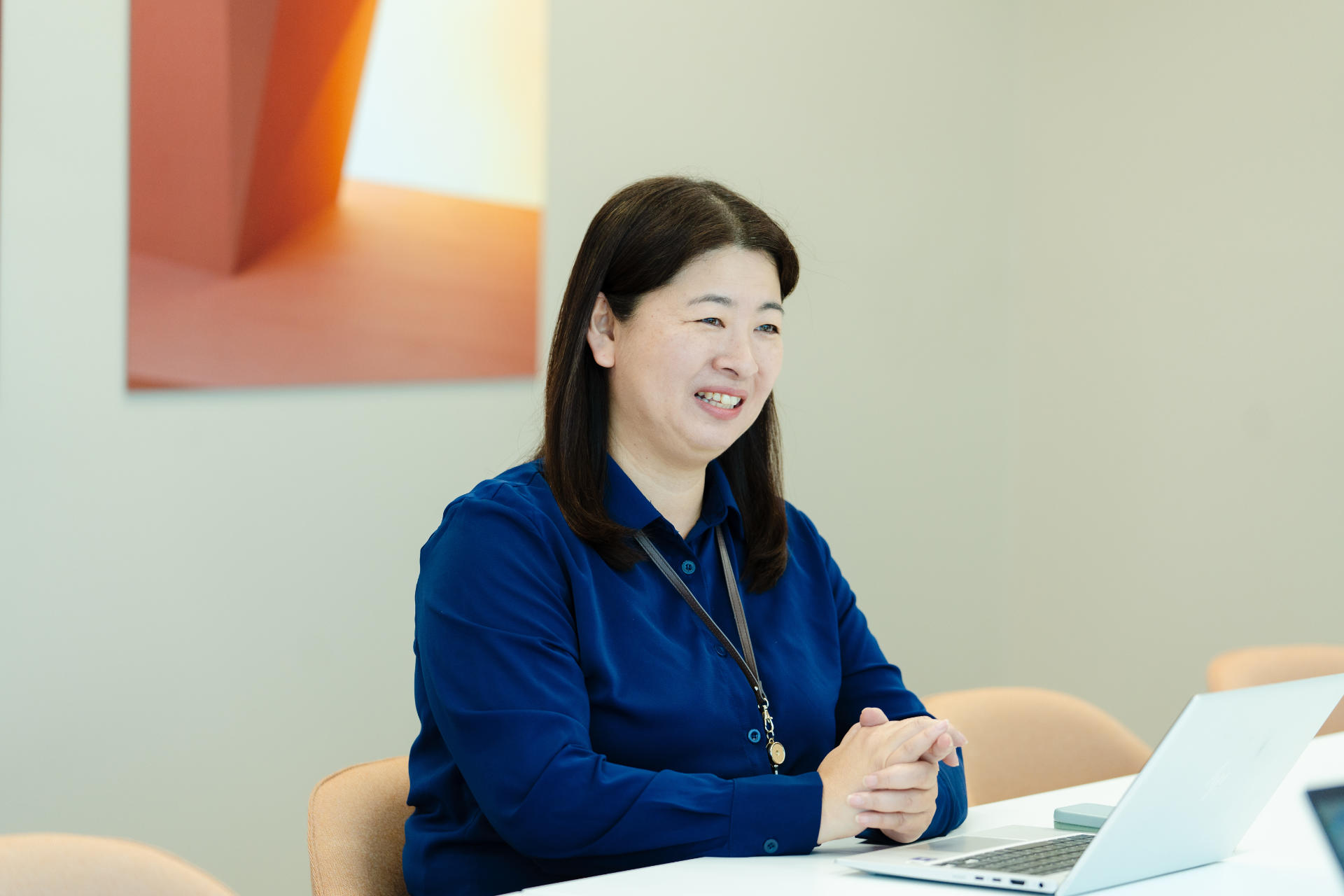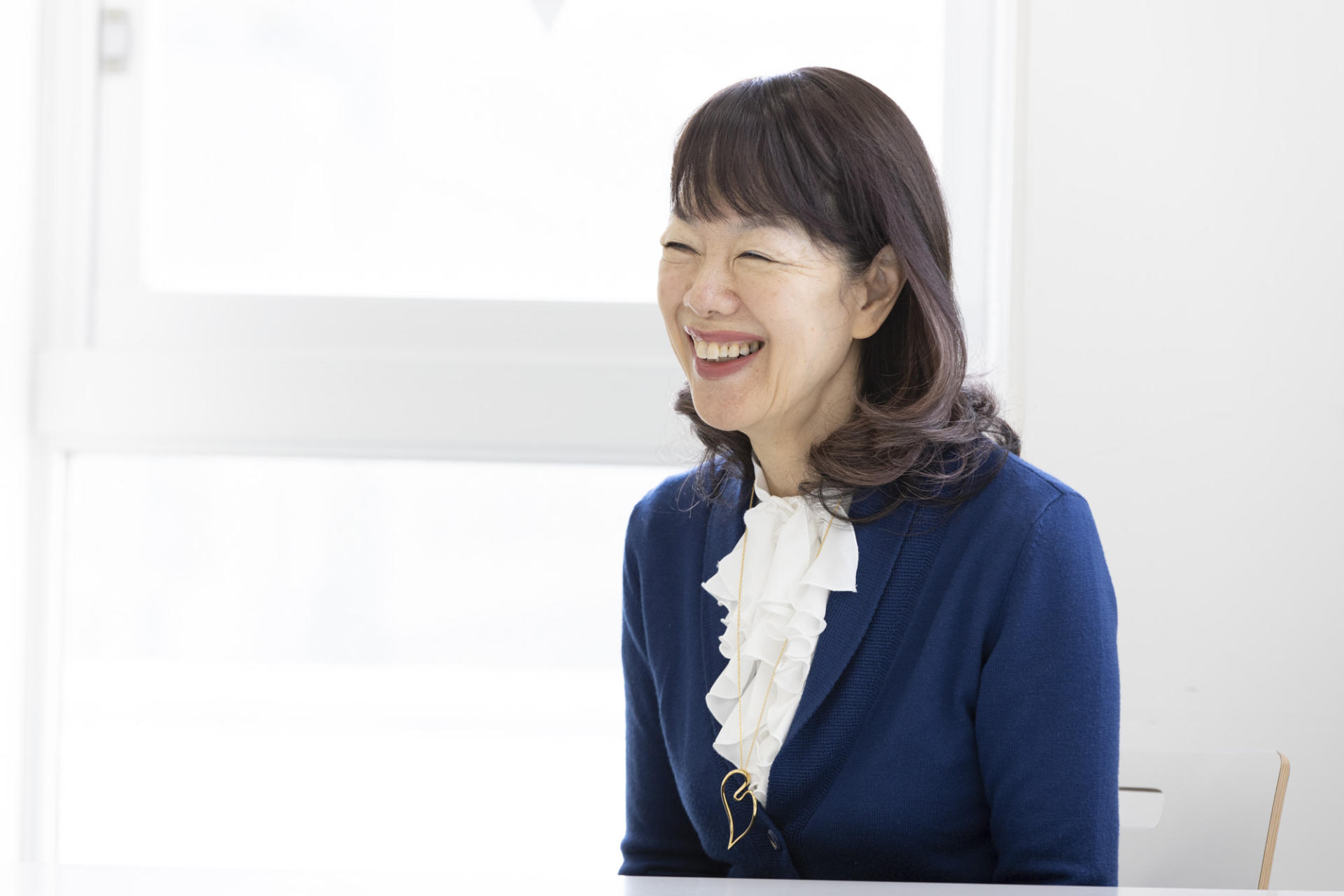CASE 23
Cocolo Works Corporation
(May 2018 – present)
Joint development of “NPO Media Training,” an approachable, immersive virtual reality training service
“Media training” is a way for organizational heads, PR personnel, and other people who have the opportunity to speak in front of the media or in public, to gain awareness and behavioral presentation skills. Despite the need to address a growing number of scandals and other negative events in recent years, there have been few media training opportunities for the NPO and NGO industries. Rather than deploy risk management consultants to address this issue, Hitoshizuku instead partnered with Cocolo Works Corporation to jointly develop a simple, immersive virtual reality (VR) training service called “NPO Media Training: VR Powered by Virtual Sensei.” We looked back over the development process with Mr. Komatsu from Cocolo Works Corporation.
We want to raise risk management awareness for NPOs and NGOs. With the development of a VR training service, obstacles associated with time and location costs can be removed.

Mr. Eiji Komatsu, CEO, Cocolo Works Corporation
Hiroshi Kokubo, Hitoshizuku supervisor (Kokubo):
Our company, in partnership with Cocolo Works Corporation, jointly developed a virtual reality (VR) media training service called “NPO Media Training: VR Powered by Virtual Sensei.” This service was designed specifically to address the needs of NPOs, NGOs, and other social sector entities.
To start, could you tell us again about Cocolo Works Corporation’s VR production business, and the advantages of VR?
Mr. Eiji Komatsu, CEO, Cocolo Works Corporation (Mr. Komatsu):
We’re a digital content development and production business that started providing VR services in 2014. Since that time we’ve used VR to create a variety of content including regional promotion materials using panoramic images, programs for medical services, training programs, and more.
VR refers to an immersive experience within a specific place or situation created through video imagery that makes full use of computer graphics (CG) and is viewed through specially designed goggles.
The biggest advantage of this technology is its ease of use. For example, an employee training session might ordinarily incur high costs due to things like space rental fees and guest lecturer honoraria. But rather than be constrained by time and space limitations, the same training session could instead be held anytime and anywhere for a low cost. And all you need is a pair of VR goggles.
Kokubo:
The service we began providing in April 2019, “NPO Media Training: VR Powered by Virtual Sensei” was developed to address exactly those sorts of training needs.
As far as what led to the development process in the first place, you and I were in the same room at the Tsunagu Hito Forum in 2017. After that, Cocolo Works asked us at Hitoshizuku to provide logistical support for “Oh! Senryu,” a mental health service platform, and it was while we were working together that I mentioned a project idea I had for NPO-focused media training.
That was when you introduced me to Virtual Sensei, which was already scheduled to be launched, so as a first step we decided to develop it with a focus toward crisis communication.
Mr. Komatsu:
You were mentioning the idea of risk management as a central theme of NPO media training from the very beginning.
Kokubo:
There were various risk-related incidents that occurred in 2018, and it became even more important to raise awareness about crisis management throughout the NPO and NGO industries.
However, despite each organization attempting to address this issue on their own, there were few media training opportunities based in real-world cases for an NPO and NGO audience due to a lack of service development at that time.
Mr. Komatsu:
The limited budget that most NPOs and NGOs have makes VR-based media training a perfect way to effectively learn about risk management, doesn’t it?
Kokubo:
Right. Our joint development couldn’t have come at a better time. Thank you very much.
The team worked as one to create an immersive VR training experience that ultimately provides well-paced risk management learning for participants.
Kokubo:
As we were creating NPO Media Training: VR Powered by Virtual Sensei, you introduced us to Mr. Minesuke Nakamura, a leading crisis management consultant at PR Japan, inc. to help supervise the project. As a result of discussion among the three of us, we ended up creating a three-part service consisting of online lectures, VR role playing, and post-training community participation.
Training participants would first watch a video by Mr. Nakamura breaking down the basic concepts of crisis management. Next, using VR goggles, participants assumed the role of a public relations spokesperson for a fictitious organization and addressed the risks of a simulated sexual harassment incident. Was there anything that you highlighted during the production process of this training program?
Mr. Komatsu:
I was most concerned with keeping the participants engaged throughout the training. The lecture video was one long set of serious discussions, and I felt that the participants would lose the ability to focus. So I inserted various animation slides into the video, and introduced the character of Virtual Sensei as a facilitator that could summarize the important points in an easy to understand manner.
Kokubo:
The visual appearance of Virtual Sensei was modeled on Mr. Nakamura, an instructor himself, and captured his physical characteristics to create an extremely approachable character. Mr. Nakamura came up with drafts of the animation slides and VR scenarios that incorporate typical risks. Since our company is in a position to understand the actual conditions surrounding NPOs, and you have a wealth of VR content creating experience, we were able to pack this training program with details and review the content from each of our unique perspectives.
Mr. Komatsu:
It really was a case of working together to combine the unique careers and skills of each person.
Kokubo:
You’re exactly right. The development was able to happen thanks to that extraordinary teamwork. Were there any other points you had to address?
Mr. Komatsu:
We had to ensure high-quality images for the VR while also being careful to not make the data too large. Rather than play the entire video, we tried a lot of new things like shooting video for only one part and developing the rest of the story using still images in the background.
Kokubo:
The VR filming required everyone working together to come up with creative solutions to produce the final product, didn’t it? For the shooting location we were able to use the NPO Support Center, a place that’s really done a lot for me over the years. Not only that, but we even had Mr. Nakamura, you, and staff members from Hitoshizuku serve as performers. Everyone really gave it their all to create this program.
Mr. Komatsu:
This was my first time appearing in a video with people from the co-developing company! (laughs)
Kokubo:
Mr. Nakamura practices Rakugo as a hobby, so having him in charge of the narration for the video really brought a wonderful emotional weight to the storytelling.
Mr. Komatsu:
He was really great, wasn’t he? Everything went more smoothly than I expected.
Kokubo:
After it was finished, what was the reaction from the people who saw it in your company?
Mr. Komatsu:
Everyone was really happy! We knew we’d made something interesting. It was a great learning experience in terms of accumulating production know-how as well.

Program creators also appeared in the VR video. They performed as members of the media who suddenly appear at the company office for more information and raise the sense of crisis for the trainees.
Kokubo:
I’m glad we were able to create something that we can be proud of.
Before we began this service, we held an NPO Crisis Management Course & VR Media Training event. Was there anything that stood out to you as you saw the various NPO organization attendees actually participating in the event?
Mr. Komatsu:
There were some attendees who had never used VR before, so I could tell they were uncomfortable with the goggles and the controls.
Also, everyone in attendance was really serious and taking lots of notes, but during the VR experience you can’t see your hands so it’s not possible to write anything down. That’s something I’d like to address for the training course going forward.
On the other hand, having to use goggles during the VR portion meant participants could really focus on the world being presented to them. You can’t do anything else, so you have no choice to focus on what’s in front of you. In that sense, I think it’s a highly effective learning service.
Some training participants gave us favorable reviews on the NPO and NGO industry-specific content. Our next step is to introduce content that encompasses the entire industry.

Feedback from NPO Crisis Management Course & VR Media Training event participants included a desire to recommend it to others
Kokubo:
What’s the significance for Cocolo Works to have developed NPO Media Training: VR Powered by Virtual Sensei?
Mr. Komatsu:
Up to now we’ve been involved with various businesses and groups, but never with an NPO. For that reason, we had no idea what NPOs and NGOs might need or what we should be aware of in our work. That’s why we’re so grateful to have had your advice and perspective throughout the joint development process. It was a great learning experience for our company, and I personally learned a lot as well.
Kokubo:
I’m so glad to hear you say that. We also got feedback from people who’d participated in mental health training who said the concrete, NPO and NGO industry-specific content created a real-world learning environment.
Moving forward, what do you think will be the key to having organizations adopt this service?
Mr. Komatsu:
Generally speaking, I think most of what businesses and people pay for is something they can directly see or experience in front of them. For this reason, getting people to invest in something that hasn’t happened yet like risk management for issue prevention is a challenge. In that sense, we need to really think more about how we go about marketing this service.
Kokubo:
You’re right. By the way, have you decided on the next topic for Virtual Sensei?
Mr. Komatsu:
Our next release is going to be the launch of a mental healthcare-themed training that our company has been working on since its founding. I’m also interested in exploring services other than live-action. Even now that meetings using online tools have become a daily fixture in our lives, I think it’s still essential to speak face to face when building relationships between people.
However, in the field of mental healthcare, there are lots of people who don’t want to speak face-to-face. This is exactly why, for example, I’d like to develop a type of service that allows users to experience a sense of connection by controlling avatars and communicating within a virtual environment.
Kokubo:
It seems like this is something that will be in demand among the younger generation of digital natives. I’m excited to see what kinds of services Cocolo Works comes up with next.
Some photographs courtesy of Cocolo Works Corporation
RECENT WORKS
| Name | Hitoshizuku Inc. |
| Address | 33 Nihonodori Naka-ku Yokohama Kanagawa 231-0021 JAPAN |
| Branch | Hamacho Odawara Kanagawa 250-0004 JAPAN |
| Phone | 81 045 900 8611 |
| info@hitoshizuku.co.jp |
| President | Hiroshi Kokubo |
| Established | March 2016 |
| Capital | 3,000,000yen |
| Business | Advertising & Public Relations Agency Planning & Produciton of Social Good Projects |
| Lawyer | Junna Tei / Yokohama First Law Office |
| Tax Advisor | Satoru Motokoide / Uniques Money Advisory |
| Labor and Social Security Attorney Office Work Innovation | |

